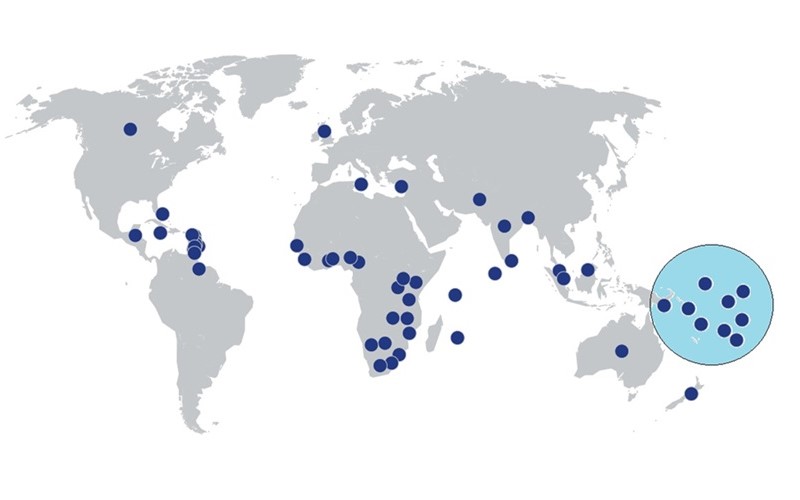
By Dr Evode Mukama
Adviser: Teacher Education COL
The pivotal role of teachers in developing skilled human capital capable of driving socioeconomic progress within their respective nations is undeniable. This significance is featured by Sustainable Development Goal 4 (SDG4). In alignment with this goal, the Commonwealth of Learning (COL) extends its support to Commonwealth countries, fostering enhanced national and educational institutional effectiveness through Open and Distance Learning (ODL). Notably, COL’s interventions benefit nine Commonwealth countries in the Pacific region: Fiji, Kiribati, Nauru, Papua New Guinea, Samoa, Solomon Islands, Tonga, Tuvalu, and Vanuatu. This reflection aims to elucidate COL’s impactful contributions to teacher professional development across the Pacific.
An integrated, resilient, and inclusive digital Pacific
According to the report on the special parallel session on the Pacific, organised during the Tenth Pan-Commonwealth Forum on Open Learning (PCF10) in Calgary, Canada, in 2022, COL has been deeply involved in teacher training initiatives in the Pacific to enhance Open Distance and Flexible Learning (ODFL). This involvement began in 2013 with the establishment of the Pacific Centre for Flexible and Open Learning for Development (PACFOLD), in collaboration with the University of the South Pacific. PACFOLD has since become the central regional network for advocating and facilitating ODFL in the Pacific.
The report also highlights that COL’s provision of relevant resources and expertise has been crucial for immediate deployment and success. The importance of ODFL in increasing educational opportunities is particularly significant in the Pacific due to its small, remote populations and limited access to higher education. The Covid-19 pandemic underscored the need for preparedness beyond traditional teaching methods, addressing challenges such as internet access, online curriculum availability, device access, and the capacity of teachers and students to utilise technology effectively for educational purposes.
The Pacific ICT Ministerial Declaration 2023 emphasises the need for Pacific countries to collaborate in developing a resilient ICT ecosystem, supporting a skilled ICT workforce, and promoting digital literacy and culturally sensitive user protection. COL’s experience shows that Open Distance Learning (ODL) can overcome geographical limitations, ensuring quality education across these scattered islands. Consequently, COL’s efforts in the Pacific region align with the recommendations from the 2023 Conference for Pacific Education Ministers, which highlighted significant concerns that require collective action through national systems, supported by regional agencies and education partners.
Improved National and Institutional Effectiveness in Leveraging ODL
In collaboration with PACFOLD, COL assisted the Pacific countries in developing national and institutional policy frameworks, ensuring the delivery of quality education and training for teachers. Additionally, COL supported these countries in developing courses aiming to equip teachers with the skills necessary for effective learner support in ODFL. These courses covered vital topics such as digital literacy, communication, assessment, learner support, and quality assurance, enabling teachers to enhance educational practices nationwide.
For example, in Fiji, COL contributed to empowering 4,150 teachers through seven ODFL courses. Additionally, COL’s support extended to the Fiji National University, nurturing the Wisdom Community of Pasifika Teachers, swelling its ranks to over 1,300 dedicated teachers through language skills training and community-building endeavours. In Kiribati, 476 teachers have been equipped to provide effective learner support in ODFL contexts. Concurrently, COL supported the Ministry of Education to enhance teacher capacity in OER and digital learning at Kiribati Teachers College.
Moreover, in collaboration with PACFOLD, COL conducted similar training for teacher professional development in ODFL programmes involving 37 teachers in Nauru, 137 teachers in Papua New Guinea (PNG), 216 teachers from Samoa, 159 in the Solomon Islands, 109 in Tonga, 76 in Tuvalu, and 398 in Vanuatu. Furthermore, in 2024, COL assisted the University of the South Pacific, Solomon Islands Campus, in providing orientation for up to 90 teachers on OER for Science, Technology, Engineering, and Mathematics (STEM) Education. This workshop model, designed for easy replication, has established a foundation for a series of similar initiatives, providing STEM educators throughout the Pacific region with extensive resources and continuous mentorship, fostering ongoing learning, professional development, and enhanced teaching quality.
ODL Course Catalogue and OER4Teachers Collection
With the assistance of COL, these nations introduced an ODL course catalogue for the Pacific in 2022, providing ODFL training courses tailored for teachers in the Pacific area. This catalogue was crafted to allow ministries and educational institutions the opportunity to access and share relevant courses specific to their respective countries.
The OER4Teachers Collection offers samples of resources that have been beneficial to teachers engaged in remote and blended teaching during recent school closures, whether caused by Covid-19 or other factors like storms, volcanic eruptions, tsunamis, droughts, or other difficulties. This collection created for each of the countries mentioned above, through the initiatives and outcomes of the partnership between COL, the PACFOLD and the Ministry of Foreign Affairs and Trade, New Zealand, seeks to enhance teachers’ competence in utilising OER within their teaching and to boost teachers’ capacity in incorporating ODFL into their instructional approaches.
Conclusion
By leveraging ODFL, COL has improved educational practices and supported several teachers across nine Pacific nations. COL Teacher training initiatives in the region have enhanced national and institutional effectiveness, digital literacy, and collaborative resource use, which are crucial for promoting quality education. Ultimately, ODFL has expanded the global reach of teachers, allowing them to connect with the world without geographical limitations, at no cost, and at any time.


